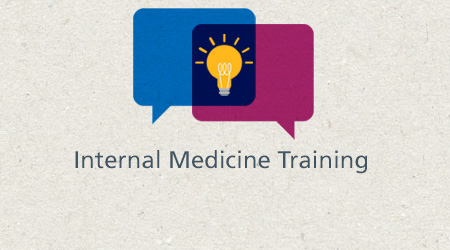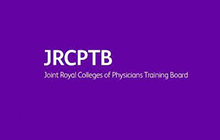About the Internal Medicine Training programme
Internal Medicine Training (IMT) is the 1st stage of speciality training for physicians. The 3-year programme prepares trainees for managing acute medical admissions at a senior level, and for managing acute and chronic medical problems, in both inpatients and outpatients. These programmes provide learning materials to support the development of both trainees and trainers in IMT.
The resources available are structured into the following courses:
For trainees:
- Managing patients in an outpatient clinic
- Resources for evidencing Internal Medicine Training (IMT) Capabilities in Practice (CiPs)
- Procedural skills training resources from the Mastery Skills Pathway (scot.nhs.uk)
For supervisors:
- An introduction to Internal Medicine Training
- How to optimise outpatient training
All about IMT (video podcasts):
National Teaching Catalogue:
Read on for information on the individual resources.
Managing patients in an outpatient clinic
Comprising of 3 sessions, this course supports the development of knowledge and skills for managing an outpatient clinic, an essential component of Internal Medicine Training (IMT), and relevant to others working in an outpatient environment. Over the course of IMT training trainees should be actively engaged in a minimum of eighty clinics, managing both acute and long-term conditions. To prepare for and enhance this training these sessions explore:
- The patient pathway from primary care
- A structured approach to an outpatient clinic appointment
- Virtual clinics and translation services
- Difficult consultations
- Special circumstances
Resources for evidencing Internal Medicine Training (IMT) Capabilities in Practice (CiPs)
Some areas of the curriculum can be difficult to achieve while working in busy clinical areas. Although we recommend trainees be flexible and opportunistic, it can be challenging to provide adequate evidence of progression in all CiPs. This course provides a list of HEE elfh sessions and courses, curated by medical trainees, which trainees may find helpful in supporting their education.
Procedural skills training resources from the Mastery Skills Pathway (scot.nhs.uk)
This course provides a link to exemplar videos on lumbar puncture, central venous cannulation, ascitic procedures, intercostal drainage and other relevant skills. These videos are useful early in procedure training and as a recap. They are from the NHS Lothian Mastery Skills Pathway, an educational, quality assurance and patient safety initiative to promote high-quality training and safe, effective patient care for high-risk procedural skills.
An Introduction to Internal Medicine Training (for trainers)
This course is aimed at Educational Supervisors of Internal Medicine Trainees. It encompasses how to write a meaningful and effective Educational Supervisor Report (ESR), and the preparation needed to achieve this. The ESR is the key document considered by the Annual Review of Competency Progression (ARCP) panel when assessing a trainee’s progress. This course sets out how to prepare to write this report, from the initial meeting with the trainee, planning the training year and through to examples of good report writing.
This session covers the following areas:
- The Educational Supervisor Report (ESR)
- Capabilities in Practice (CiPs)
- Evidence
- Setting up the Training Year
- The ARCP
How to optimise outpatient training
‘Training the trainer’ in an outpatient clinic facilitates the delivery of effective and efficient education; this is applicable within Internal Medicine Training (IMT) and for others delivering care in an outpatient environment. This session supports trainers to create an appropriate training environment, understand essential components of training, and relevant educational theory. This session encompasses aspects both before, during and after a clinic, and includes:
- Learning objectives
- Capabilities in Practice (CiPs)
- Trainees’ portfolio requirements
- Patient-centred decision making
- Professionalism and good communication
- Assessment of a trainee
- Performance enhancing feedback
- The use of educational theory
All about IMT (video podcasts):
This series of video podcasts provides concise summaries of key areas of challenge in the IMT programme. They support understanding of the IMT curriculum and training requirements for prospective IMTs, and new Educational Supervisors or College Tutors.
- How to get the most out of your Educational Supervisor – Jess Michael talks to Tina Mehta
- Preparing for your ARCP + Interim review – Jess Michael talks to Jane Wallace
- Acute take training + ACATs – Jess Michael talks to Phil Bright
- Outpatient Training – Jess Michael talks to Katherine Mellor
- Preparing for Higher Specialty Training applications – Jess Michael talks to Carolyn Mackinlay
National Teaching Catalogue
The NHS Learning Hub hosts an IMT specific catalogue of teaching sessions recorded and stored from centres across the UK. The sessions are catalogued in relation to the fourteen Capabilities in Practice (CiPs) and the IMT Curriculum. These resources are accessible for two years, and support local and regional delivery of teaching programmes with a view to facilitating flexible learning, and the sharing of resources. These resources can be accessed here: https://learninghub.nhs.uk/Catalogue/IMTwebinars
More information
The practice of medicine is changing. A growing aging population means there are more patients with multiple co-morbidities which are not necessarily linked, except because they occur more frequently with increasing age.
The Shape of Training report recognised this and required a shift in the training of doctors with a much greater emphasis on ‘generalism’. This challenge was picked up by the physicians with the development of the new Internal Medicine Training programmes. Their development has also provided an opportunity to move significantly away from the previous generation of training to one that takes a more holistic approach to the assessment of each trainee.
Clinical lead

Dr Tina Mehta
Clinical Lead, Consultant Gastroenterologist, Lead College Tutor for South West and College Tutor at the Royal United Hospitals Bath NHS Foundation Trust
Quality assurance

Dr Phil Bright
Head of School Medicine, HEE WM, Clinical Advisor, Internal Medicine Training, HEE, Clinical Lead, Physician Specialty Recruitment Office
Managing patients in an outpatient clinic author teams, session 1

Session 1 author lead: Dr Chloe Broughton
Consultant, Diabetes and Endocrinology at the Royal United Hospitals Bath NHS Foundation Trust. She is clinical lead for antenatal endocrinology and diabetes with a specialist interest in the use of emerging technology to manage diabetes
Dr Alexandria Waldron
Internal Medicine Trainee – Year 1, Severn deanery
Dr May Ho
Internal Medicine Trainee – Year 2, Severn deanery
Dr Namritha Ramanujam
Internal Medicine Trainee – Year 3, the Royal United Hospitals Bath NHS Foundation Trust
Dr Ben McKee
Internal Medicine Trainee – Year 3, Severn deanery
Dr Anil Gurung
Internal Medicine Trainee – Year 2, Severn deanery
Managing patients in an outpatient clinic author team, session 2

Session 2 author lead: Dr Rebecca Mason
Respiratory Consultant and Associate Director for Medical Education (Support) at the Royal United Hospitals Bath NHS Foundation Trust
Dr Thuvaarahan Thanaraaj
IMT doctor and Associate College tutor at the Royal United Hospitals Bath NHS Foundation Trust
Dr Jack Evans
IMT doctor and Associate College tutor at the Royal United Hospitals Bath NHS Foundation Trust
Dr Hannah Watson
IMT doctor at the Royal United Hospitals Bath NHS Foundation Trust
Dr Aimee Leadbetter
IMT doctor and Associate College tutor at the Royal United Hospitals Bath NHS Foundation Trust
Managing patients in an outpatient clinic author teams, session 3

Session 3 author lead: Dr Gurjit Chohan
Consultant Neurologist at the Royal United Hospitals Bath NHS Foundation Trust and Clinical and Educational Supervisor to Foundation and IMT trainees
Dr Laura Backhouse
Gastroenterology ST5 in the Severn Deanery and currently working at Royal United Hospitals Bath NHS Foundation Trust as a Chief Registrar on the leadership programme
Dr Phil Starbuck
Internal Medicine Trainee – Year 2, the Royal United Hospitals Bath NHS Foundation Trust
Dr Natalie Anwyll
Internal Medicine Trainee – Year 1, Severn Deanery, in addition to volunteering as an Associate College Tutor
Dr Holly Duncan
Internal Medicine Trainee – Year 3, Severn Deanery and is currently working in the Royal United Hospitals Bath NHS Foundation Trust
How to optimise outpatient training author group

Author lead: Dr Carolyn Mackinlay
Consultant Respiratory Physician at Great Western Hospitals NHS Foundation Trust and Training Programme Director for Internal Medicine Training in the Severn Deanery.
Dr Garazi Zubikarai
Internal Medicine Trainee – year 3 at Great Western Hospitals NHS Foundation Trust having trained within the Severn Deanery and worked as a Clinical Teaching Fellow
Dr Hoi-Ting Wong
Internal Medicine Trainee - year 1 at Great Western Hospitals NHS Foundation Trust with an interest in Cardiology/Respiratory. Previously worked in the Severn Deanery and Australia as a junior doctor
Dr James Pilcher
Internal Medicine Trainee – year 1 at Great Western Hospitals NHS Foundation Trust. Completed Foundation Training and a Clinical Fellowship in Acute Medicine in the South Thames Deanery
Dr Hoi Man Chau
Internal Medicine Trainee – year 2 at Great Western Hospitals NHS Foundation Trust, and currently has taken up the role of associate college tutor
All about IMT (video podcasts)

Author lead: Dr Jess Michael
Internal Medicine Trainee - year 2 at The Royal United Hospitals NHS Foundation Trust
Author lead: Dr Tina Mehta
Consultant Gastroenterologist, Lead College Tutor for South West and College Tutor at the Royal United Hospitals Bath NHS Foundation Trust, Interim Training Programme Director for Internal Medicine Training in the Severn Deanery
Dr Phil Bright
Head of School Medicine, HEE WM, Clinical Advisor, Internal Medicine Training, HEE, Clinical Lead, Physician Specialty Recruitment Office
Dr Katherine Mellor
Consultant Acute Medicine Physician at Torbay and South Devon NHS Foundation Trust and Training Programme Director for Internal Medicine Training in the Peninsula Deanery
Dr Jane Wallace
Consultant Geriatrician at Northumbria Healthcare Foundation Trust, Training Programme Director for Internal Medicine Training in Northern Deanery, co-chair for National Advisory Committee for Internal Medicine Training
National Teaching Catalogue

Dr Hoi Man Chau
Internal Medicine Trainee – year 3 at Royal United Hospitals Bath NHS Foundation Trust, and currently an Associate College Tutor
Dr Tina Mehta
Consultant Gastroenterologist, Lead College Tutor for South West and College Tutor at the Royal United Hospitals Bath NHS Foundation Trust, Interim Training Programme Director for Internal Medicine Training in the Severn Deanery
Project Team

Dr Tina Mehta
Clinical Lead, Consultant Gastroenterologist, Lead College Tutor for South West and College Tutor at the Royal United Hospitals Bath NHS Foundation Trust
Dr Phil Bright
Head of School Medicine, HEE WM, Clinical Advisor, Internal Medicine Training, HEE, Clinical Lead, Physician Specialty Recruitment Office
Andi Blackmore
Programme Manager - Technology Enhanced Learning, NHS England
Marnie Greenrod
Project Manager - Technology Enhanced Learning, NHS England
Wendy Lowe
Learning Designer - Technology Enhanced Learning, NHS England
Rashmi Chavda
Graphic Designer - Technology Enhanced Learning, NHS England
Louise Garrahan
Communications and Stakeholder Officer - Technology Enhanced Learning, NHS England
Claire Huby
Communications Programme Manager, NHS England
How to access
In order to access any elfh programme, you will need an elfh account. If you do not have one, then you can register by selecting the Register button below.
To view the Internal Medicine Training programme, select the View button below. If you already have an account with elfh, you will also be able to login and enrol on the programme from the View button.
If you already have an account with elfh, then you can enrol on to theInternal Medicine Training programme by logging in to the elfh Hub, selecting My Account > Enrolment and selecting the programme. You can then access the programme immediately in the My e-Learning section.
NHS healthcare staff in England – ESR
The Internal Medicine Training programme is also available to NHS healthcare staff via the Electronic Staff Record (ESR). Accessing this e-learning via ESR means that your completions will transfer with you throughout your NHS career.
Further details are available here.
Not an NHS organisation?
If you are not an NHS health or care organisation and therefore do not qualify for free access elfh Hub, you may be able to access the service by creating an OpenAthens account.
To check whether or not you qualify for free access via OpenAthens, you can view the eligibility criteria and register on the ‘OpenAthens’ portal.
Registering large numbers of users
If you are a HR, IT or Practice Manager and would like to register and enrol large numbers of staff within your organisation for access onto the Internal Medicine Training programme, please contact elfh directly.
Organisations wishing to use their own LMS
For HR departments wanting to know more about gaining access to courses using an existing Learning Management System please contact elfh directly to express interest.
More information
Please select the following link for more information on how to use the elfh Hub.





